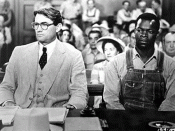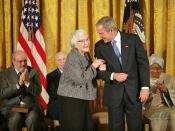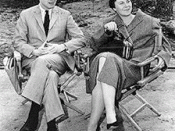Prejudice today seems as something people say by accident: without knowing what the dangers of the words leaving their mouth would cause. Playing ball at a local park a kid yells to his teammate who just struck out, "stop playing like a girl" making it seem as though it is an insult to be a girl, another example: while talking to your brother who is on the computer, you notice him listening to Coldplay and accuse him of being gay, not being completely aware of your prejudice against homosexuals. Nearly sixty-five years into the past, during the depression era, people acted similarly in the realistic fiction, "To Kill a Mockingbird", written by Harper Lee. In this story prejudice is a reoccurring theme and is presented by social and racial categories.
Prejudice in "To Kill a Mockingbird" occurs frequently throughout the story. Many times someone is being prejudice toward someone else, they use the phrase to be more insulting or intimidating, usually because that's how they were brought up.
Francis, Scout and Jem's cousin, yells, "He's nothin' but a nigger-lover!" Referring to Atticus, while he was sprinting down the hall to his kitchen. Believing what he is saying is correct, Francis says, "[...] it certainly does mortify the rest of the family" After listening to his grandma he is convinced that Jem and Scout "[...] don't know any better" (83). Mrs. Merriweather said later in the book that "there's nothing more distractin' than a sulky darky [...] just ruins your day to have one of them in your kitchen." (232) Mrs. Merriweather didn't mean that statement to be prejudice, but that's how I, as the reader, read it and perceived it.
Racial prejudice is extremely abundant in this novel. Tom Robinson is a great example of prejudice later in...


